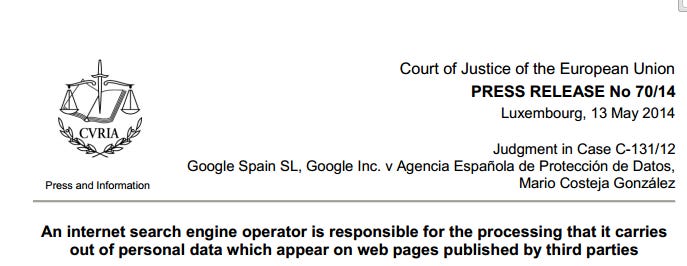EU Court: Right to be forgotten trumps right to know; Google must remove search results on request

It might be the Pandora's Box of all Pandora's Boxes. A European Union court has ruled that Google must remove results from its search engine that point to a newspaper post about a Spanish resident's 1988 auction of his repossessed home. With the ruling, the European Union Court of Justice sided with the newfangled concept of a "right to be forgotten" over the importance of free access to information.
The case is a head-on collision between privacy rights and free speech rights.
In its ruling, the court said entities like Google must weigh the value of the information being passed along against a person's right to move on without being haunted by former life events.
"The Court observes in this regard that even initially lawful processing of accurate data may, in the course of time, become incompatible with the directive where, having regard to all the circumstances of the case, the data appear to be inadequate, irrelevant or no longer relevant, or excessive in relation to the purposes for which they were processed and in the light of the time that has elapsed," the court wrote in its opinion.
Supporters cheered the result as a victory for those concerned with personal privacy.
"The ruling confirms the need to bring today's data protection rules from the digital stone age into today's modern computing world where data is no longer stored on "a server", or once launched online disappears in cyber-space," wrote EU Justice Commissioner Viviane Reding on her Facebook page. She also thinks to ruling will force Google and other firms to change their policies globally, extending the power of the EU rule. "Companies can no longer hide behind their servers being based in California or anywhere else in the world," she said.
But the ruling concerns journalists and other who fear that the ruling means critical information can now erased from the Internet by anyone who doesn't like it.
A group called the Index on Censorship condemned the decision, telling the BBC it "violates the fundamental principles of freedom of expression."
"It allows individuals to complain to search engines about information they do not like with no legal oversight," it said. "This is akin to marching into a library and forcing it to pulp books."
The ruling, which offers little practical guidance for balancing public interest and privacy rights, also seems to suggest that companies like Google will have to field such requests and make determinations of relevance and timeliness.
And that's an Internet-sized Pandora's Box.


